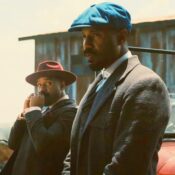Tiny Tim: King for a Day
⭐ ⭐ ⭐ ⭐
Run Time: 1 hour 18 minutes
Stars: Tiny Tim (Herbert Khaury), Johnny Carson, Dan Rowan, Dick Martin, D.A. Pennebaker, Wavy Gravy
Writer: Martin Daniel
Director: Johan von Sydow
In Theaters
Ours is a strange culture that has the uncanny ability to lionize individuals for a moment or two, then dispose of them with such sudden effectiveness they all but disappear from the national memory.
That certainly seems to have been the case with Tiny Tim, the stringy-haired, fluttery-voiced, ukulele-playing singer who was arguably the biggest name in show business for a solid year or so beginning in 1968.
Documentarian Johan von Sydow’s nostalgic, funny, tuneful, and ultimately tragic biography of Tim — real name Herbert Khaury — is as much a portrait of Americans’ fickle fancies as it is an account of the performer’s lifetime of undulating fortunes. Certainly, the naive, waif-like singer who stubbornly resisted hewing to musical norms of the time comes off a lot better here than the rest of us do.
To startled audiences who witnessed his first TV performance — January 22, 1968, on the premiere episode of Rowan and Martin’s Laugh-In — Tiny Tim was an overnight sensation. But as the film reminds us, Herbert Khaury had been honing his act for more than a decade in the clubs of New York’s Greenwich Village. Averting his gaze from his audiences, seemingly unaware that five decades had passed since the Tin Pan Alley songs he performed so fervently had been actual hits, he seemed like a show biz novice. But in fact, he knew exactly what he was doing, and he was clear-eyed about exactly who he was: The product of a troubled childhood, a deeply religious believer consumed with guilt over what he saw as personal sins — and a man who, while he desperately desired show biz immortality, nevertheless determined he would achieve it on his own wildly unorthodox terms.
Von Sydow has pulled together vintage film from Tiny Tim’s early days in the village, segments from his countless appearances with Rowan and Martin and on Johnny Carson’s Tonight Show — plus amateur video clips of his heartbreaking later personal appearances. Most affectingly, he has enlisted Grammy winning performer Weird Al Yankovic — a performer who, like Tiny Tim, has defiantly forged a career tailored to his unique talents — to read passages from Tim’s personal diaries. Those words sometimes offer glimpses into Tim’s artistic vision — but more often than not they read as anguished prayers to God for deliverance from the demons that lurked behind his innocent facade.
Tiny Tim: King for a Day, includes all the clips you’d expect: That galvanizing first appearance on Laugh-In, his wedding to Miss Vicki on The Tonight Show — which drew a TV audience second in size only to humanity’s first steps on the moon. There’s his triumphant performance at the Isle of Wight Festival, where his rendition of “Tiptoe Through the Tulips” stole the show before a half-million rapturous hard rock lovers.
But there’s one clip that stands out, and provides a glimpse into the future that Tiny Tim might have enjoyed had he not allowed himself to be promoted as a novelty act for the rest of his life. It’s a segment from a Tonight Show episode in which Tim, backed by a string orchestra, gives a reading of Gordon Jenkins’ “This is All I Ask” that rivals the finest versions of Frank Sinatra and Tony Bennett. The singer comes at the song from an utterly unexpected direction — not as an old man looking back on his life, but as a younger man, asking only one thing: that he be accepted for who he is. His pitch is perfect, his trademark warble brings an enhanced sense of vulnerability to one of Jenkins’ most evocative songs. When Tiny Tim is finished, Johnny Carson is visibly moved, and perhaps a bit stunned by the depth of this performance. All he can say is, “I think you may have surprised a lot of people.”
Given his ambiguous persona, the film makes the case that Tiny Tim paved the way for gender-bending performers like David Bowie, Prince, and Boy George. That may be true to an extent, but it’s counterproductive to lump Tim in with any group of performers. They didn’t break the mold after Tiny Tim — the mold never existed prior to him. Sad and joyous, insecure and bold, a musical throwback who hurled show biz conventions to the wind, he seemed to have sculpted himself freeform, from scratch.
Featured image: Juno Films
Become a Saturday Evening Post member and enjoy unlimited access. Subscribe now




Comments
It’s a movie I’d love to see. I doubt it has much future in theaters, but think it will certainly find its niche audience on one or more streaming services. Your description of his singing “This is All I Ask” ( and you are right, it is a brilliant song, written by Gordon Jenkins for the staggering Frank Sinatra masterpiece of 1965, “The September of My Years” ) is fascinating. You’ve made the movie something I must catch up with, if only to see that.
I wonder if Herbert Khaury, who always seemed as if he were such a kind man, could have pivoted to a more conventional career with enduring success? He was different, that’s for sure. So were the Beatles. But the Beatles were odd and beguiling. We’d never seen anything like them. We’d never seen anything like Tiny Tim, either, but Mr Khaury settled for the bizarre possibly because he lacked the confidence to believe he could have a conventional success in entertainment. His may have been a grab the hot money while it’s coming at you, because it won’t be coming for long attitude.
There’s no question that he loved those songs, as much as the young Bobby Zimmerman loved American roots music before he became Bob Dylan, as much as the markedly less odd than Tiny Tim performer, Leon Redbone, did, and heck, as much as I do.
There is one major jazz singer, Catherine Russell, whose career I cherish because her affinity is also for those somewhat too disreputable for Tin Pan Alley songs. The other evening, I heard her recording of “Darktown Strutters’ Ball,” a song Tiny Tim may well have had in his repertoire, also.
Thanks for an absolutely great article.
Thanks for making Post readers aware of this documentary on the one and only Tiny Tim! He and Rowan & Martin’s Laugh-In were a match made in heaven. It was already the right show at the right time, and Tim’s appearances were the perfect frosting on top of that zany cake!
Laugh-In itself was both a state-of-the-art comedy/variety show but with very strong ties to the live vaudeville comedy shows of long ago. Though gone many decades before my time, I can’t help but think (and hope) Tiny Tim would have fit right in as a popular vaudevillian entertainer in the 1910’s and Roaring ’20s when the entertainment form was flourishing.
Tim’s musical, comedic and whimsical style also lent itself to the avant-garde aspects of the late ’60s and the beginnings of longing for the nostalgia of a more genteel, gracious era; disappearing at a rapid rate then. His appearances (and marriage to Miss Vickie) on the Tonight Show enriched Johnny’s shows with some of the highest high points his show and career would ever have as well.